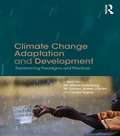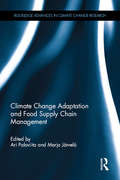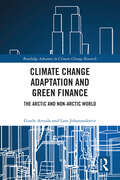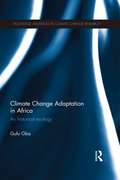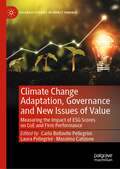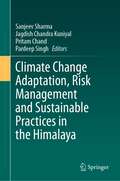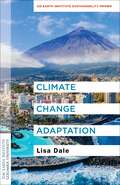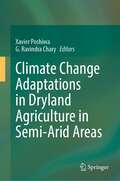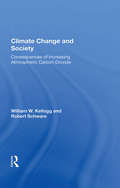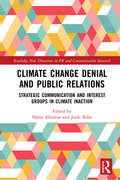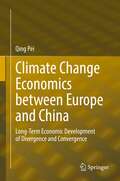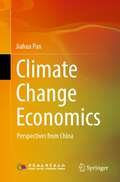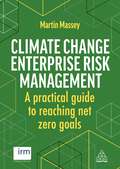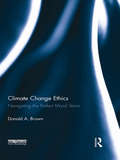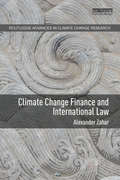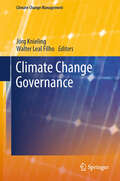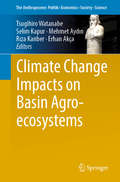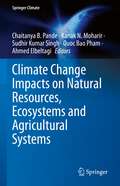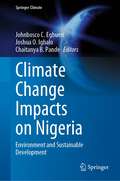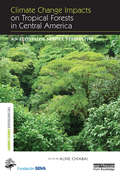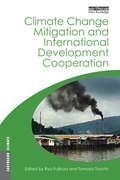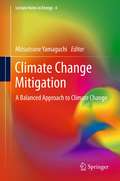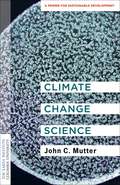- Table View
- List View
Climate Change Adaptation and Development: Transforming Paradigms and Practices (Climate And Development Ser.)
by Karen O'Brien Tor Håkon Inderberg Siri Eriksen Linda SygnaClimate change poses multiple challenges to development. It affects lives and livelihoods, infrastructure and institutions, as well as beliefs, cultures and identities. There is a growing recognition that the social dimensions of vulnerability and adaptation now need to move to the forefront of development policies and practices. This book presents case studies showing that climate change is as much a problem of development as for development, with many of the risks closely linked to past, present and future development pathways. Development policies and practices can play a key role in addressing climate change, but it is critical to question to what extent such actions and interventions reproduce, rather than address, the social and political structures and development pathways driving vulnerability. The chapters emphasise that adaptation is about much more than a set of projects or interventions to reduce specific impacts of climate change; it is about living with change while also transforming the processes that contribute to vulnerability in the first place. This book will help students in the field of climate change and development to make sense of adaptation as a social process, and it will provide practitioners, policymakers and researchers working at the interface between climate change and development with useful insights for approaching adaptation as part of a larger transformation to sustainability.
Climate Change Adaptation and Food Supply Chain Management (Routledge Advances in Climate Change Research)
by Marja Järvelä Ari PaloviitaThe success of the entire food supply chain depends on the prosperity of farms and local communities. The direct climate change risks faced by the agricultural sector are therefore also risks to businesses and food supply chains. Hence the importance of resilience at farm level, community level and business level when looking at food supply chain policy and management. Climate Change Adaptation and Food Supply Chain Management highlights the issue of adaptation to climate change in food supply chains, the management and policy implications and the importance of supply chain resilience. Attention is given to each phase of the supply chain: input production, agriculture, food processing, retailing, consumption and post-consumption. European case studies demonstrate the vulnerabilities of contemporary food supply chains, the opportunities and competitive advantages related to climate change, and the trans-disciplinary challenges related to successful climate adaptation. The authors argue for a redefinition of the way food supply chains are operated, located and coordinated and propose a novel approach enhancing climate-resilient food supply chain policy and management. This book will be of interest to students, researchers, practitioners and policymakers in the field of climate adaptation and food supply chain management and policy.
Climate Change Adaptation and Green Finance: The Arctic and Non-Arctic World (Routledge Advances in Climate Change Research)
by Gisele Arruda Lara JohannsdottirThis book presents specific case studies of climate finance in the Arctic and examines how the green revolution could be a game changer in this sensitive region. Bringing together contributions from a range of experts in the field, Climate Change Adaptation and Green Finance assesses the costs of inaction versus the costs of action based on case study examples of climate finance and sustainable investment in the Arctic region. The authors draw on data from the Sixth Assessment Report published by the Intergovernmental Panel on Climate Change and respond with a solutions-based framework. This is developed around the notion of a new, carbon-neutral economy in the Arctic and presents methods for unlocking carbon finance and long-term climate investment in the region, such as finance for Arctic entrepreneurs and resilient sustainable investment structures. This volume also looks at the role of finance in meeting the United Nations Sustainable Development Goals and the ways in which innovation in investment will help shape the future of the Arctic. Climate Change Adaptation and Green Finance will be of great interest to students and scholars of climate change, sustainable finance and sustainable business
Climate Change Adaptation and Green Finance: The Arctic and Non-Arctic World (Routledge Advances in Climate Change Research)
by Gisele Arruda Lara JohannsdottirThis book presents specific case studies of climate finance in the Arctic and examines how the green revolution could be a game changer in this sensitive region.Bringing together contributions from a range of experts in the field, Climate Change Adaptation and Green Finance assesses the costs of inaction versus the costs of action based on case study examples of climate finance and sustainable investment in the Arctic region. The authors draw on data from the Sixth Assessment Report published by the Intergovernmental Panel on Climate Change and respond with a solutions-based framework. This is developed around the notion of a new, carbon-neutral economy in the Arctic and presents methods for unlocking carbon finance and long-term climate investment in the region, such as finance for Arctic entrepreneurs and resilient sustainable investment structures. This volume also looks at the role of finance in meeting the United Nations Sustainable Development Goals and the ways in which innovation in investment will help shape the future of the Arctic. Climate Change Adaptation and Green Finance will be of great interest to students and scholars of climate change, sustainable finance, and sustainable business.
Climate Change Adaptation in Africa: An Historical Ecology (Routledge Advances in Climate Change Research)
by Gufu ObaIn the context of growing global concerns about climate change, this book presents a regional and sub-continental synthesis of pastoralists' responses to past environmental changes and reflects on the lessons for current and future environmental challenges. Drawing from rock art, archaeology, paleoecological data, trade, ancient hydrological technology, vegetation, social memory and historical documentation, this book creates detailed reconstructions of past climate change adaptations across Sahelian Africa. It evaluates the present and future challenges to climate change adaptation in the region in terms of social memory, rainfall variability, environmental change and armed conflicts and examines the ways in which governance and policy drivers may undermine pastoralists’ adaptive strategies. The book’s scope covers the Red Sea coast, Somaliland, Somalia, the Ogaden region of Ethiopia, and northern Kenya, part of the Ethiopian highlands and Eritrea, areas where past climate change has been extreme and future change makes it vital to understand the dynamics of adaptation. This book will be of interest to students and scholars of environmental history, human ecology, geography, climate change, environment studies, development studies, pastoralism, anthropology and African studies.
Climate Change Adaptation, Governance and New Issues of Value: Measuring the Impact of ESG Scores on CoE and Firm Performance (Palgrave Studies in Impact Finance)
by Carlo Bellavite Pellegrini Laura Pellegrini Massimo CatizoneThis book investigates sustainability, CSR, climate change adaptation, the relevance of ESG scores and their impact on firm value and growth. The first part of the book analyses the topics from a conceptual angle. The authors discuss how the concepts of self-consciousness and awareness drive the shift of the traditional concept of corporate mission towards more sustainable business models. The authors propose an in-depth analysis of the main challenges posed by climate change and of the initial policy-makers’ responses and provide their view on the central role of ESG scores and circular economy for growth and development. The authors conclude with an analysis of the main literature on the measurement of the relation between ESG scores and firms’ performance and cost of equity (CoE). The second part of the book contains comparative empirical evidence, supporting these theories across specific industries, and will be of interest to academics, researchers, and students of sustainability and impact finance.
Climate Change Adaptation, Risk Management and Sustainable Practices in the Himalaya
by Sanjeev Sharma Pardeep Singh Jagdish Chandra Kuniyal Pritam ChandThis volume analyzes ecological and socio-economic risks due to climate change in the Himalayan mountain ecosystems, communities, and proposes adaptation strategies and sustainability practices. In order to better understand the potential actions required to improve natural resource conservation and the development of mountain people's livelihoods. The authors discuss the current status of local knowledge system on various environmental aspects of conservation and sustainable use of mountain resources in the Himalaya. The book addresses the institutional capacities, gaps, and priority areas of capacity building to strengthen policies and governance in regard to climate change, landuse management, biodiversity conservation, and sustainable management in the Himalayan region. The aim of this book is to enhance coordination building among policymakers, planners, mountain communities to foster collaboration between different stakeholders by understanding local perceptions of climate change as well as variability issues, and establishing adaptation strategies to cope with these impacts. The chapters incorporate theoretical and applied aspects, and may serve as baseline information for the sustainability of mountain ecosystems through the contribution of multidisciplinary and interdisciplinary expertise from the Himalayan region. The book will be useful for students, teachers, and researchers working in different areas pertaining to mountain ecosystems, as well as policymakers and planners working on issues related to the sustainability of the mountain ecosystem.
Climate Change Adaptation: An Earth Institute Sustainability Primer (Columbia University Earth Institute Sustainability Primers)
by Lisa DaleClimate change policy has typically emphasized mitigation, calling for reducing emissions and shifting away from fossil fuels. Yet while these efforts have floundered, floods, wildfires, droughts, and other disasters are becoming more frequent and potent. As the risks escalate, we must ask how to adapt to a changing climate. How might farmers modify their practices to maximize food security? Can coastal cities protect their infrastructure from rising seas? Are there strategic ways for developing countries to combine climate resilience with economic growth and poverty reduction? For people and societies around the world, these questions are not theoretical: adaptation is already underway.This book offers a concise overview of climate adaptation governance. In clear, accessible language, Lisa Dale describes key strategies that governments, communities, and the private sector are now deploying. She presents the theory and practice that underlie climate adaptation efforts at local and global scales, providing illuminating case studies that foreground the problems facing developing countries. Dale analyzes the effectiveness of a range of policy interventions, drawing out principles of good governance and discussing how practitioners can navigate complex tradeoffs. She emphasizes equity and inclusion, considering how climate adaptation policy can account for the needs of historically disadvantaged groups. Written for a wide audience, this book is an invaluable introduction for all readers interested in how societies can meet the challenges of an altered climate.
Climate Change Adaptations in Dryland Agriculture in Semi-Arid Areas
by G. Ravindra Chary Xavier PoshiwaThis book highlights the approaches for achieving trans-disciplinary research integration for “semi-arid dryland agriculture systems” under changing climates, while also identifying the elements of a collaborative research agenda that are needed to advance global food security. The book emphasizes climate change being a reality and how drylands are bearing the brunt in diverse ways. The major impact of dryland agriculture is on communities that need to: avoid the short- and long-term impacts of the changing climate; adapt strategies that can minimize these impacts; and be able to mitigate climate change, for which they need climate smart interventions. These interventions are only realized through knowledge and experience sharing among stakeholders from different sectors and backgrounds. It is in this context that the publication was seen as a necessity in order to bring together ideas that will transform lives and build adaptation capacities, thereby providing the much-needed products in communities leading to development
Climate Change And Society: Consequences Of Increasing Atmospheric Carbon Dioxide
by William W. KelloggAs man's ability to disrupt the climate becomes increasingly apparent,evidence is mounting that human-activity-induced climate changes may well rival anything nature can produce. If the consensus of the international climatological community is correct, and if worldwide use of fossil fuel continues to increase atmospheric carbon dioxide, mankind is
Climate Change Denial and Public Relations: Strategic communication and interest groups in climate inaction (Routledge New Directions in PR & Communication Research)
by Núria Almiron Jordi XifraThis is the first book on climate change denial and lobbying that combines the ideology of denial and the role of anthropocentrism in the study of interest groups and communication strategy. Climate Change Denial and Public Relations: Strategic Communication and Interest Groups in Climate Inaction is a critical approach to climate change denial from a strategic communication perspective. The book aims to provide an in-depth analysis of how strategic communication by interest groups is contributing to climate change inaction. It does this from a multidisciplinary perspective that expands the usual approach of climate change denialism and introduces a critical reflection on the roots of the problem, including the ethics of the denialist ideology and the rhetoric and role of climate change advocacy. Topics addressed include the power of persuasive narratives and discourses constructed to support climate inaction by lobbies and think tanks, the dominant human supremacist view and the patriarchal roots of denialists and advocates of climate change alike, the knowledge coalitions of the climate think tank networks, the denial strategies related to climate change of the nuclear, oil, and agrifood lobbies, the role of public relations firms, the anthropocentric roots of public relations, taboo topics such as human overpopulation and meat-eating, and the technological myth. This unique volume is recommended reading for students and scholars of communication and public relations.
Climate Change Economics between Europe and China: Long-Term Economic Development of Divergence and Convergence
by Qing PeiThis book is the first attempt to highlight the Great Divergence between Europe and China from the perspective of environmental change. The author discusses the agrarian economy while considering the effects of climate change in both Europe and China at a long-term scale. The findings in the book supplement current knowledge and discussion on the Great Divergence across Eurasia. The book further aims to empirically review the climatic impacts on the human community in the past as the relevant historical reference by which to understand human–nature linkages in the current Anthropocene epoch. The statistical analysis in the book will contribute to the development of relevant subjects, such as environmental humanities, quantitative history, and historical geography. The book thus is suitable to all levels of students, undergraduate and postgraduate, in the university. In summary, by combining multiple disciplines in both methods and knowledge, this book becomes an interesting reference to students, academic staff, and even the general public. It may also appeal to policymakers, who aim to address the impacts of climate change according to past societal experiences.
Climate Change Economics: Perspectives from China
by Jiahua PanThis book establishes theories and methods of climate change economics based on the perspective of human development. The book, in two volumes, consists of papers and research reports authored by Pan Jiahua or researchers under his guidance. Professor Pan Jiahua is a leading figure in the field of political economy in climate change and has written extensively. The book is divided into four parts, covering theories, methods, governance, and policies. • The theory part includes the general economics of climate change, the political economy of climate change, carbon emissions, and human development. • The method part covers the economic analysis of greenhouse gas reduction and economics of low-carbon economic development. • The governance is on the design and construction of international climate regimes and China's role and choice. • Finally, the policy part consists of three chapters: policy choices for low-carbon transformation, energy-saving emission reduction, and low-carbon development and adaptation to climate change. The disciplines involved in climate change economics include welfare economics, development economics, international political economics, and property rights economics. In the context of multidisciplinary cross-cutting, the economics of climate change has evolved. The book proposes theories, methods and offers policy solutions and cases. It is of high academic and empirical value for developing countries to strive for fair rights and interests in international climate negotiations, obtain development space, and pursue a low-carbon and ecological economy. Professor Jiahua Pan and his team at the Chinese Academy of Social Sciences have contributed greatly to the development of climate change economics in China. Their work has laid the foundation of climate change economics from basic concepts, frameworks, and systems and has a great significance in promoting the development of climate change economics.
Climate Change Enterprise Risk Management: A Practical Guide to Reaching Net Zero Goals
by Martin MasseyDevelop and execute a resilient climate change enterprise risk strategy that can be tailored to any organization with this essential guide for risk professionals and business leaders. Climate Change Enterprise Risk Management equips readers with a practical roadmap for how organizations can integrate climate change into their enterprise risk strategy. It offers guidance on how to secure a robust framework that can identify and manage climate threats and opportunities for a business, how to increase the visibility of climate risk management activities at board level, and how and when to implement techniques such as thresholds, mitigation strategies, monitoring capabilities and risk appetite metrics. The book covers both existing best practice risk management tools and how they can be adapted for climate enterprise risk management as well as new interdisciplinary tools like stakeholder mapping. Climate Change Enterprise Risk Management is richly supported by global examples, interviews and case studies representing a wide range of companies and industries including the insurance, finance, infrastructure, oil and gas, legal and auditing sectors.This is a must-read for all risk professionals and business leaders involved in developing and executing enterprise risk management and strategy. It will also be valuable reading for students taking modules on enterprise risk management and climate change, sustainable business and risk management.
Climate Change Ethics: Navigating the Perfect Moral Storm
by Donald A. BrownClimate change is now the biggest challenge faced by humanity worldwide and ethics is the crucial missing component in the debate about what to do about this enormous threat. This book examines why thirty-five years of discussion of human-induced warming has failed to acknowledge fundamental ethical concerns, and subjects climate change’s most important policy questions to ethical analysis. This book examines why ethical principles have failed to gain traction in policy formation and recommends specific strategies to ensure that climate change policies are consistent with ethical principles. Because climate change is a global problem that requires a global solution and given that many nations refuse participation due to perceived inequities in proposed international solutions, this book explains why ensuring that nations, sub-national governments, organizations, businesses and individuals acknowledge and respond to their ethical obligations is both an ethical and practical mandate. This book is the first of its kind to go beyond a mere account of relevant ethical questions to offer a pragmatic guide on how to make ethical principles influential in formulating the world’s response to climate change. Written by Donald A. Brown, a leading voice in the field, it should be of interest to policy makers, and those studying environmental policy, climate change policy, international relations, environmental ethics and philosophy.
Climate Change Finance and International Law (Routledge Advances in Climate Change Research)
by Alexander ZaharSince 2010, a significant quantity of international climate change finance has begun to reach developing countries. However, the transfer of finance under the international climate change regime – the legal and ethical obligations that underpin it, the constraints on its use, its intended outcomes, and its successes, failures, and future potential – constitutes a poorly understood topic. Climate Change Finance and International Law fills this gap in the legal scholarship. The book analyses the legal obligations of developed countries to financially support qualifying developing countries to pursue globally significant mitigation and adaptation outcomes, as well as the obligations of the latter under the international regime of financial support. Through case studies of climate finance mechanisms and a multitude of other sources, this book delivers a rich legal and empirical understanding of the implementation of states’ climate finance obligations to date. The book will be of interest to scholars and students of international law and policy, international relations, and the maturing field of climate change law.
Climate Change Governance (Climate Change Management)
by Walter Leal Filho Jörg KnielingClimate change is a cause for concern both globally and locally. In order for it to be tackled holistically, its governance is an important topic needing scientific and practical consideration. Climate change governance is an emerging area, and one which is closely related to state and public administrative systems and the behaviour of private actors, including the business sector, as well as the civil society and non-governmental organisations. Questions of climate change governance deal both with mitigation and adaptation whilst at the same time trying to devise effective ways of managing the consequences of these measures across the different sectors. Many books have been produced on general matters related to climate change, such as climate modelling, temperature variations, sea level rise, but, to date, very few publications have addressed the political, economic and social elements of climate change and their links with governance. This book will address this gap. Furthermore, a particular feature of this book is that it not only presents different perspectives on climate change governance, but it also introduces theoretical approaches and brings these together with practical examples which show how main principles may be implemented in practice.
Climate Change Impacts on Basin Agro-ecosystems (The Anthropocene: Politik—Economics—Society—Science #18)
by Selim Kapur Erhan Akça Tsugihiro Watanabe Mehmet Aydın Rıza KanberThis book is based on the outcomes of a Turkish-Japanese bilateral project dealing with the impacts of climate change on basin agro-ecosystems. The book is unique in showing an up-to-date knowledge for the developing world. The chapters are related to: a) the development and improvement of a regional climate model for a more accurate prediction with higher resolution of future changes in regional climate, b) the structure of land and water management in agricultural production systems in arid areas, especially to quantitatively evaluate the relationships among cropping systems, hydrological cycle and water balance in farmland and its environments, c) the assessment of the impact of climate change and its adaptation on agricultural production systems, mainly on the aspect of land and water management, and d) the vulnerability of agricultural production systems from natural changes and the measures for enhancing sustainability of agriculture.This book elaborates on the methodologies for the assessment of climate change impacts on agricultural production and adaptationIn this book, the concepts and processes of an integrated approach are outlined, and its application in a case project is introducedThe approaches described in the chapters would be applicable in different situations and could be improved with experience and the introduction of advanced techniques
Climate Change Impacts on Natural Resources, Ecosystems and Agricultural Systems (Springer Climate)
by Sudhir Kumar Singh Chaitanya B. Pande Kanak N. Moharir Quoc Bao Pham Ahmed ElbeltagiThis book on the climate change, natural resources, landscape and agricultural ecosystems describes the contributing challenges related to natural resources, soil erosion, irrigation planning, water, landscape, sustainable crop yield agriculture and biomass estimation. Natural resources and agricultural ecosystems include factors from nearby regions where landscape and agriculture practices (direct or indirect) interface with the water, vegetation, irrigation planning and ecology. Changes in climatic situations impact all the natural resources, ecology, and landscape of agricultural systems, which affects productivity. This book summarizes the various aspects of soil erosion, soil compaction, soil nutrients, aquifer and water with respect to vegetation, crops, pest and sustainable yields and management for the future. It also focuses on the use of precision techniques, remote sensing, GIS technologies, IOT and climate related technology for the sustainability of ecology, natural resources and agricultural areas, along with the capacity and flexibility of natural resources and agricultural societies under climate change. This book presents both theoretical and applied aspects and will help as a guide for future research. The contents will appeal to researchers, scientists, and NGOs working in climate change, environmental sciences, agriculture engineering, remote sensing, natural resources management, remote sensing, GIS, hydrologist, soil sciences, agricultural microbiology, plant pathology and agronomy.
Climate Change Impacts on Natural Resources, Ecosystems and Agricultural Systems (Springer Climate)
by Sudhir Kumar Singh Chaitanya B. Pande Kanak N. Moharir Quoc Bao Pham Ahmed ElbeltagiThis book on the climate change, natural resources, landscape and agricultural ecosystems describes the contributing challenges related to natural resources, soil erosion, irrigation planning, water, landscape, sustainable crop yield agriculture and biomass estimation. Natural resources and agricultural ecosystems include factors from nearby regions where landscape and agriculture practices (direct or indirect) interface with the water, vegetation, irrigation planning and ecology. Changes in climatic situations impact all the natural resources, ecology, and landscape of agricultural systems, which affects productivity. This book summarizes the various aspects of soil erosion, soil compaction, soil nutrients, aquifer and water with respect to vegetation, crops, pest and sustainable yields and management for the future. It also focuses on the use of precision techniques, remote sensing, GIS technologies, IOT and climate related technology for the sustainability of ecology, natural resources and agricultural areas, along with the capacity and flexibility of natural resources and agricultural societies under climate change. This book presents both theoretical and applied aspects and will help as a guide for future research. The contents will appeal to researchers, scientists, and NGOs working in climate change, environmental sciences, agriculture engineering, remote sensing, natural resources management, remote sensing, GIS, hydrologist, soil sciences, agricultural microbiology, plant pathology and agronomy.
Climate Change Impacts on Nigeria: Environment and Sustainable Development (Springer Climate)
by Chaitanya B. Pande Johnbosco C. Egbueri Joshua O. IghaloThis book explores the impacts of climate change on Nigeria. How climate change impacts the productivity and future development of different sectors in Nigeria was covered in this book. Various themes of the Nigerian economy, environment, and climate change were considered. Worthy of note are the impacts of climate change on the Nigerian air quality, surface and groundwater resources, watershed and natural resources’ development and planning, soil- quality, fertility, salinization, nutrients and cropping patterns. Also, the impact of climate change on land use/land cover, urbanization and strategic planning, crops and sustainable crop yield; land degradation, soil erosion, landslides and landscapes, rainfall trend patterns, drought vulnerability; ecology, vegetation/forest, carbon and biomass management of Nigeria were investigated. Finally, the problems of climate change in semi-arid and arid regions (with special emphasis on Nigeria) and possible solutions for sustainable development under the changing climate were discussed in this book. Advanced technologies, such as remote sensing, GIS, multivariate analytical tools, and machine learning techniques, were utilized in the exploration and analysis of the themes of this book. Thus, this book is a very important product for point of view researchers, scientists, NGOs, and university communities on the Nigerian climate change. This book is a useful interdisciplinary tool, cutting across various disciplines such as earth sciences, hydrology, environmental sciences, soil science, engineering, remote sensing, natural resources management, and public health management, etc.
Climate Change Impacts on Tropical Forests in Central America: An ecosystem service perspective (The Earthscan Forest Library)
by Aline ChiabaiThe loss of biodiversity is a major environmental problem in nearly every terrestrial ecosystem on Earth. This loss is accelerating driven by climate change, as well as by other causes including agricultural exploitation, fragmentation and degradation triggered by land use changes. The crucial issue under debate is the impact on the welfare of current and future population, and the role of humans in the exploitation of natural resources. This is of particular importance in Central America, which it is amongst the richest and most threatened biodiversity regions on the Earth, and where the loss of ecosystems strongly affects its socio-economic vulnerability. This book addresses the impacts of climate and land-use change on tropical forest ecosystems in this important region, and assesses the expected economic costs if no policy action is taken, under different future scenarios and for different geographical scales. This innovative collection utilises both theoretical approaches and empirical results to provide a conceptual framework for an integrated analysis of climate and land-use change impacts on forest ecosystems and related economic effects, offering insight into the complex relationship between ecosystems and benefits to humans. This important contribution to forest ecosystems and climate change provides invaluable reading for students and scholars in the fields of environmental and ecological economics, environmental science and forestry, natural resource management, agriculture and climate change.
Climate Change Mitigation and Development Cooperation (Earthscan Climate)
by Ryo Fujikura Tomoyo ToyotaThis is a companion book to Earthscan’s 2010 book Climate Change Adaptation and International Development. This book consists of summarised case studies looking at climate change mitigation specifically in Asia, the region producing the most greenhouse gas emissions. It examines international development from the perspective of climate change mitigation and looks at how international communities and donors support developing nations by funding, technical assistance and capacity building.
Climate Change Mitigation: A Balanced Approach to Climate Change (Lecture Notes in Energy #4)
by Mitsutsune YamaguchiClimate change is mainly caused by emissions of CO2 from burning fossil fuels, which provides over 85% of the world's energy. Strategies for mitigating climate change are connected with handling economic and social activities through their effects on the use of energy. Climate Change Mitigation investigates the costs of mitigation measures in comparison to their benefits, and compares the effects of implementing mitigation measures on various areas such as energy security and energy economy. "For 20 years, diplomats have struggled to make progress on climate change, mostly because global diplomacy is not well-linked to the realities of how nations and firms control emissions and adapt to the impacts of a changing climate. In this excellent book, Dr Yamaguchi has assembled experts to guide the redesign of global policy. The authors underscore how global warming efforts must resonate with other policy goals." David G. Victor, Director, Laboratory on International Law and Regulation and Professor, University of California San Diego "Climate Change Mitigation clarifies that climate change cannot be controlled by sacrificing economic growth or other global problems; however, action to control climate change cannot be delayed.Climate policy is pervasive and affects all dimensions of international policy;but it cannot be too ambitious: a balanced approach between mitigation and adaptation, economic growth and resource management, and short term development and long term investments, should be adopted. I recommend its reading." Carlo Carraro,President, Ca' Foscari University of Venice "The International Energy Agency estimates for every $1 of investment now toward sustainable energy, $4 of future spending can be saved. There is a business case for companies to reduce energy use. Companies in the energy and resource intensive industries must lead the way." Chad Holliday, Chairman. World Business Council for Sustainable Development and former Chair and CEO, DuPont
Climate Change Science: A Primer for Sustainable Development (Columbia University Earth Institute Sustainability Primers)
by Dr. John C. MutterHow will future climates be different from today’s world—and what consequences will changes in climate have for societies and their development strategies? This book is a primer on the essential science for grasping the workings of climate change and climate prediction. It is accessible for readers with little to no background in science, with an emphasis on the needs of those studying sustainable development.John C. Mutter gives a just-the-facts overview of how the climate system functions and what we know about why changes occur. He recounts the evolution of climatology from the earliest discoveries about Earth’s climate to present-day predictive capabilities, and clearly presents the scientific basis of fundamental topics such as climate zones, ocean-atmosphere dynamics, and the long-term cycles from glacial to interglacial periods. Mutter also details the mechanisms of climate change and the ways in which human activity affects global climate. He explains the science behind some known consequences of rising temperatures, such as sea level rise, hurricane behavior, and climate variability. The primer discusses how climate predictions are made and examines the sources of uncertainty in forecasting. Climate Change Science is a straightforward and easy-to-read treatment of the fundamental science needed to comprehend one of today’s most important issues.
